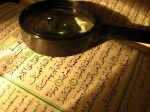09 February 2012
Educational bias: Memorise the Quran for twenty extra marks
 LAHORE: Haroon Arif, a student from DG Khan in Punjab, could not get high enough marks to get into medical school. This is a standard situation for many young people in the country. What’s different here
LAHORE: Haroon Arif, a student from DG Khan in Punjab, could not get high enough marks to get into medical school. This is a standard situation for many young people in the country. What’s different here
is that Haroon, who missed the grade by less than 0.1%, would have earned 20 extra marks if he was Hafiz-e-Quran. He tried to claim his knowledge of the Bible was equivalent, but this made no impact.
“I deserved it and yet just because I am Christian, I have been put at a disadvantage,” Haroon says.
He found out about the discrimination on viewing the results at his test centre last month. “There was a separate column for Hafiz-e-Quran, and I found out that those who had memorised the holy book got 20 extra marks,” he adds.
Haroon got A grades in both matriculation and intermediate exams, but was an agonising 0.0255% behind the line for medical school in his final aggregate. This miniscule figure changed the course of his life.
“I know of students who did not perform well in the test and had lower marks in their matriculation and intermediate exams, but they got in, just because of these twenty marks,” he complains.
Haroon tried to show the university his three certificates in Bible education, but the authorities said they had no policy to accept these. Since Haroon’s parents are poor, his only hope was a government-run medical university, where fees are 10% of what private universities charge.
His father is a health worker and his mother a nurse. “I have seen my parents in this profession but only as support staff. Is that all Christians are destined to do?” he asks.
Haroon refused to give up. “My father could not afford a lawyer so I decided to approach a human rights organisation, who advised me to go to the courts for help.”
In his petition, Haroon maintained that under Article 25 his rights have been violated, as no person should be denied the same protection which is enjoyed by other citizens of Pakistan. Along with his documents, he submitted two letters, one from the Church of Pakistan and the other from the Bishop of Islamabad, clearly stating that Haroon’s religious education is at par with any Islamic education.
“Despite all relevant documents from competent authorities, the courts did not acknowledge this as a human rights issue,” says Peter Jacob, head of the organisation Haroon approached. “They are passing the matter on to the next authority, and we have been unable to get any positive response from anywhere,” Peter says, adding that there is a policy vacuum as the government never addresses educational bias.
The University of Health Sciences, which conducts the medical tests, seems to think it is not its domain to make policy.
“This is a sensitive religious issue, and we cannot change policy on our own. The same happens in engineering universities also, and it has been in place since the time of Zia-ul-Haq,” says Mohammad Atif, the head of public affairs at the university, adding that around 50 students were given 20 extra marks this year since they were Hafiz-e-Quran.
“We realise this is against human rights and have debated a lot on this policy, since minorities are being marginalised – but we follow government orders,” he adds.
While the university is at least debating the discriminatory nature of this policy, Punjab’s education minister showed little concern when contacted. “We cannot change the system because of a nominal amount of people,” said Mujtaba Shuja-ur-Rehman.
Despite everything, Haroon remains hopeful. “I am as much a Pakistani as any Muslim, we are all equal citizens and the government will realise this,” he says.
22:49 Posted in PAKISTAN, Real Islam | Permalink | Comments (0) | ![]() Facebook |
Facebook |



















The comments are closed.